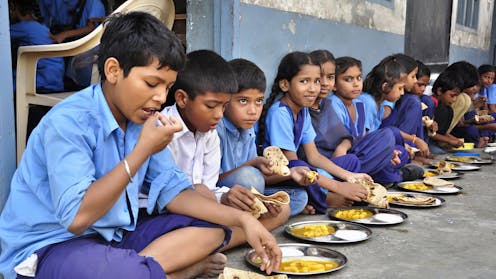England is expanding free school meals – here’s what could happen if they were given to all children
Children in Jharkhand state, India, eating their midday meal at school. Mohammad Shahnawaz/Shutterstock
The UK government has announced an extension of free school meals in England to all children whose parents receive universal credit, in order to address child hunger and poverty.
The government claims that half a million more pupils will now have access to school lunches for free. The total number of children registered for free school meals in England is currently about 2.2 million, or about 26% of the total school population. In addition, all children in infant school, aged between four and seven, are entitled to receive a hot lunch at school.
But given the high rates of child poverty in the UK, and the value a decent meal provides, there is evidence that free school meals for all children could provide significant benefits in England.
The provision in Scotland and Wales is more generous: free school meals for children from primary one to five in Scotland (ages four to ten) and for all children in primary school in Wales. But other countries make provision for all children, in both primary and secondary education, to receive meals at school.
Get your news from actual experts, straight to your inbox. Sign up to our daily newsletter to receive all The Conversation UK’s latest coverage of news and research, from politics and business to the arts and sciences.
Child poverty in the UK continues to be historically high. In 2023-24, 3.4 million children – 23% of all children in the UK – were in relative income poverty. Incidence of child poverty is particularly acute in cities.
In the UK, the COVID-19 pandemic and Brexit resulted in a rise in unemployment. This in turn led to widespread instances of extreme poverty and child hunger. The lack of active policies in the UK to address child hunger, malnourishment and increasing childhood obesity has been widely criticised by the British Medical Association.
The UK’s experience of high levels of child poverty is in stark contrast with most other high-income countries. The UK ranked 37th out of 39 by child income poverty, ahead only of Turkey and Colombia, in 2023. In comparison, the UK’s adult poverty rate is close to the OECD average, ranking 23rd out of 39 high-income countries. This implies that child poverty can be high even if adult poverty levels are relatively low.
Global policy choices
Providing nutritious free school meals is a fundamental cornerstone of government policy to ensure child welfare. It’s used as a poverty alleviation measure all over the world. Almost half of the world’s school meals are free, feeding 418 million children.
Many of these programmes are based in developing countries. The world’s largest free school meal programme runs in India: the “mid-day meal scheme” feeds 125 million children aged six to 14 and costs the equivalent of £2 billion each year. Similar successful programmes are run in Brazil and some African countries, with another having recently been launched in Indonesia.
But schemes in Finland and Sweden also cover almost all school children.
There is a growing body of global evidence on the wider beneficial effects of free school meals on child poverty. Free school meals in India have resulted in higher cognitive outcomes. They have increased school enrolment and school attendance, and thus educational outcomes.
They have also been found to have an intergenerational effect. In India, fewer shorter children were born to women who had benefited from the country’s school food programme.
Nutritionally balanced school meals have proven health benefits.
Pixel-Shot/Shutterstock
Nutritionally balanced children’s school meals are also associated with lower incidence of obesity. Studies in the US and UK, for example, have shown universal provision is linked to lower obesity rates.
Research into the Swedish scheme has found that children who have free school meals with prescribed nutritional standards not only have higher educational attainment and better health outcomes in adulthood, but also higher incomes. Children from families in the lowest income quartile in Sweden who received free school meals for nine years increased their lifetime income by 6%.
Other tangible economic benefits include significant reductions in potential healthcare costs as a result of malnutrition and non-communicable diseases. A 2025 European Union report estimates the return from investment in school meal programmes is at least sevenfold, up to a possible €34 for every €1 spent.
While there is rich scientific and economic evidence that universal free school meals are immensely beneficial, a child’s access to nutrition and government support to obtain nourishment is also a fundamental human right. The School Meals Coalition is an international consortium of 108 countries to achieve free school meals for all by 2030. The UK is one of the few advanced countries not signed up to it.
Sanghamitra Bandyopadhyay does not work for, consult, own shares in or receive funding from any company or organisation that would benefit from this article, and has disclosed no relevant affiliations beyond their academic appointment.


